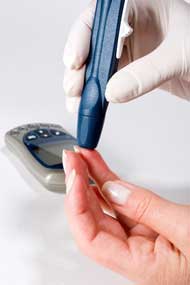 Diabetes is a serious disease that affects how your body processes sugar. Another aspect of the disease is a reduced resistance to infection and decreased or slower healing. It is estimated that around 20 million people have diabetes but more than half of those people are undiagnosed.
There’s a dental connection too. Because of the reduced healing and increased susceptibility to infections, people with diabetes are more prone to developing oral infections as well as periodontal disease, when compared to those without diabetes, a two-fold problem for diabetics.
Diabetics are more prone to periodontal disease, which is the chronic inflammation and infection of the gums and surrounding tissues. If left untreated, it can lead to irreversible destruction of the tissues and tooth loss. Also, serious periodontal disease has the potential to affect a diabetics blood sugar control which in turn reduces healing ability and further increases the susceptibility to infection.
Diabetes can also cause other oral problems such as thrush or candidiasis (a yeast infection in the mouth) and dry mouth. This can lead to soreness, ulcers, infections and cavities.
Diabetes is a serious disease that affects many aspects of our health. Its important to keep your blood sugar under control and see a physician regularly to maintain good health. Also, you should be seeing a dentist regularly to help keep your oral health pristine and aid in maintaining good overall health.]]>
Diabetes is a serious disease that affects how your body processes sugar. Another aspect of the disease is a reduced resistance to infection and decreased or slower healing. It is estimated that around 20 million people have diabetes but more than half of those people are undiagnosed.
There’s a dental connection too. Because of the reduced healing and increased susceptibility to infections, people with diabetes are more prone to developing oral infections as well as periodontal disease, when compared to those without diabetes, a two-fold problem for diabetics.
Diabetics are more prone to periodontal disease, which is the chronic inflammation and infection of the gums and surrounding tissues. If left untreated, it can lead to irreversible destruction of the tissues and tooth loss. Also, serious periodontal disease has the potential to affect a diabetics blood sugar control which in turn reduces healing ability and further increases the susceptibility to infection.
Diabetes can also cause other oral problems such as thrush or candidiasis (a yeast infection in the mouth) and dry mouth. This can lead to soreness, ulcers, infections and cavities.
Diabetes is a serious disease that affects many aspects of our health. Its important to keep your blood sugar under control and see a physician regularly to maintain good health. Also, you should be seeing a dentist regularly to help keep your oral health pristine and aid in maintaining good overall health.]]>
 We want to cover the topics that you really want to know about.
What’s the best way of finding these topics? Going directly to the source- our patients and readers!
Send us a question or topic that you would like us to write about and we’ll address it in one of our upcoming blog posts.
And of course, if you have any personal concerns, call us at our office: (212) 245-2888.]]>
We want to cover the topics that you really want to know about.
What’s the best way of finding these topics? Going directly to the source- our patients and readers!
Send us a question or topic that you would like us to write about and we’ll address it in one of our upcoming blog posts.
And of course, if you have any personal concerns, call us at our office: (212) 245-2888.]]>
 Smoking is not only bad for your heart and lungs but your mouth too.
Here are the alarming statistics:
Smoking is not only bad for your heart and lungs but your mouth too.
Here are the alarming statistics:
- Smokers are three times more likely than non-smokers to lose all their teeth. This figure has not changed from a decade ago.
- Smoking can result in periodontal gum disease, bad breath, staining of the tongue and teeth, delayed healing and complications with certain dental procedures, plaque build-up, and a diminished sense of taste and smell.
- About 28,000 people are diagnosed with oral cancer a year and 7,200 die from oral cancer each year.
- It has been reported by the Academy of General Dentistry that a one-pack-a-day smoking habit can cost you the loss of at least two teeth every 10 years. Smoking can also lead to seven times the risk of developing gum disease compared to non-smokers.
- About eight out in ten people with mouth and throat cancers are tobacco users. On average, 40 percent of those with the disease will not survive more than five years after being diagnosed, as quoted by the American Dental Association.
- According to the American Cancer Society, it is estimated that about 8 out of 10 oral cancers could be prevented by avoiding both tobacco and alcohol use. Many of the chemicals found in tobacco can damage DNA directly. Scientists are not sure whether alcohol directly damages DNA but they have shown that alcohol helps many DNA-damaging chemicals get into cells more easily. This may be why the combination of tobacco and alcohol damages DNA far more than tobacco alone.
Frangella Dental
Offering advanced techniques in Cosmetic and General Dentistry in New York City.
200 W. 57th Street, Suite 1405
New York, NY 10019
(212) 245-2888
care@drfrangella.com


